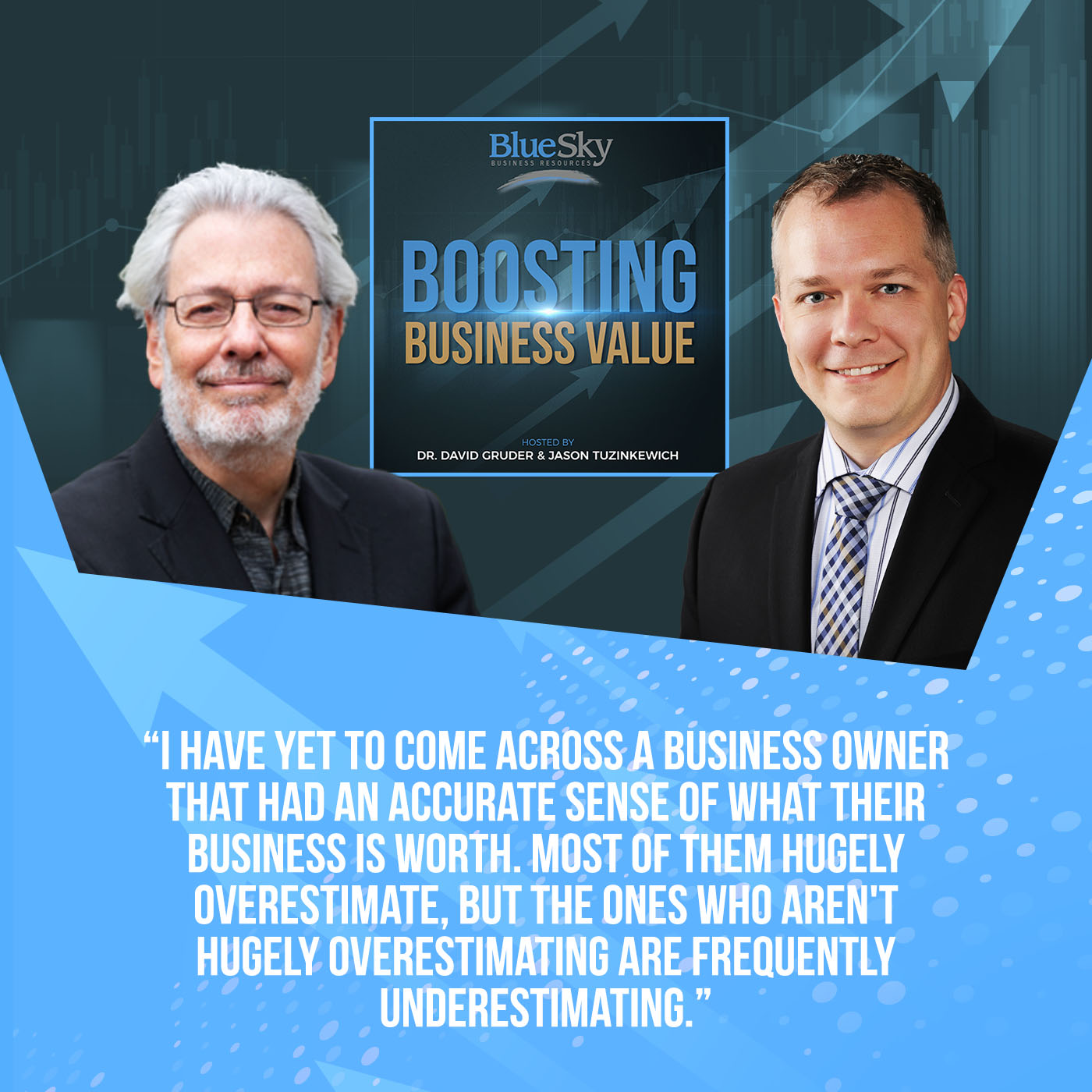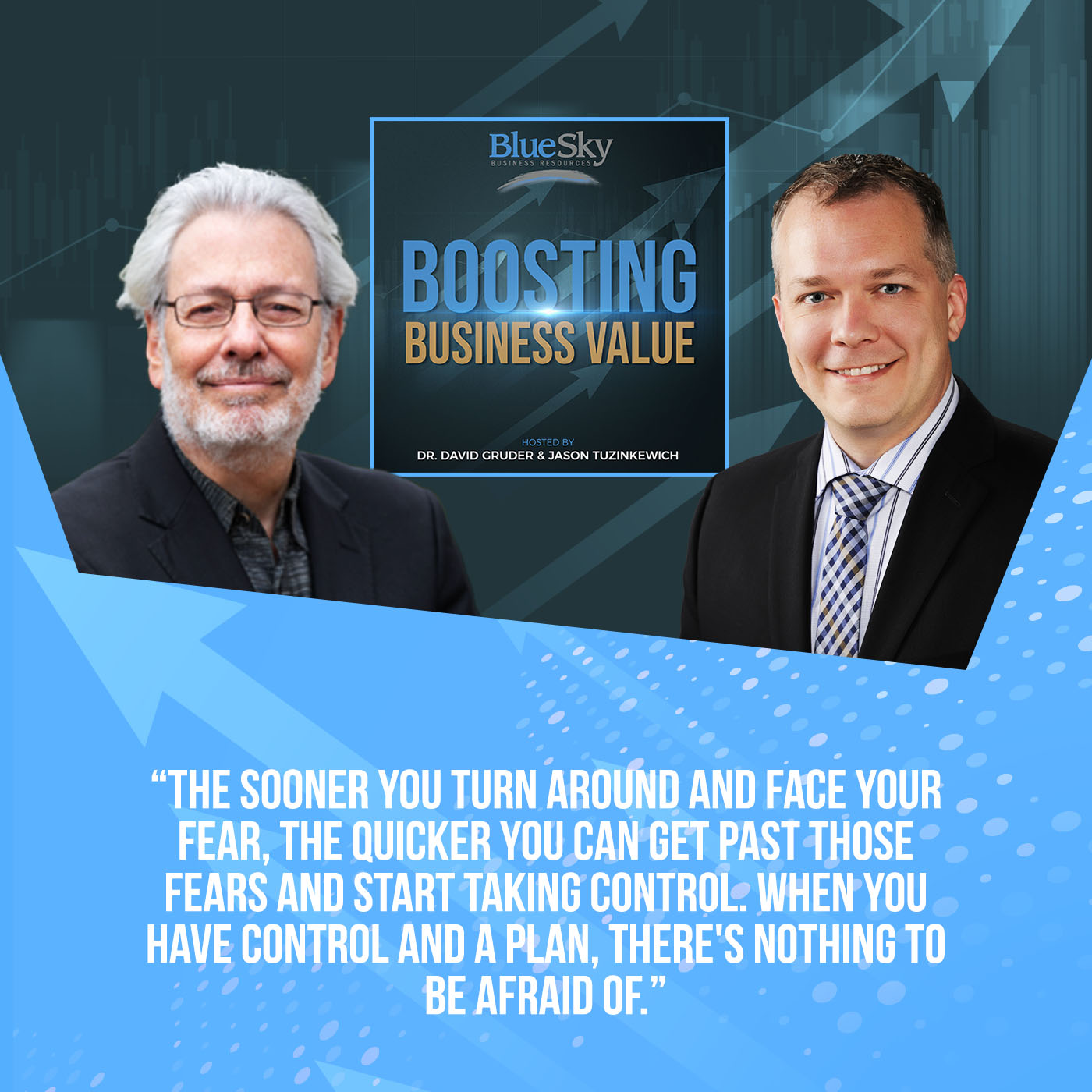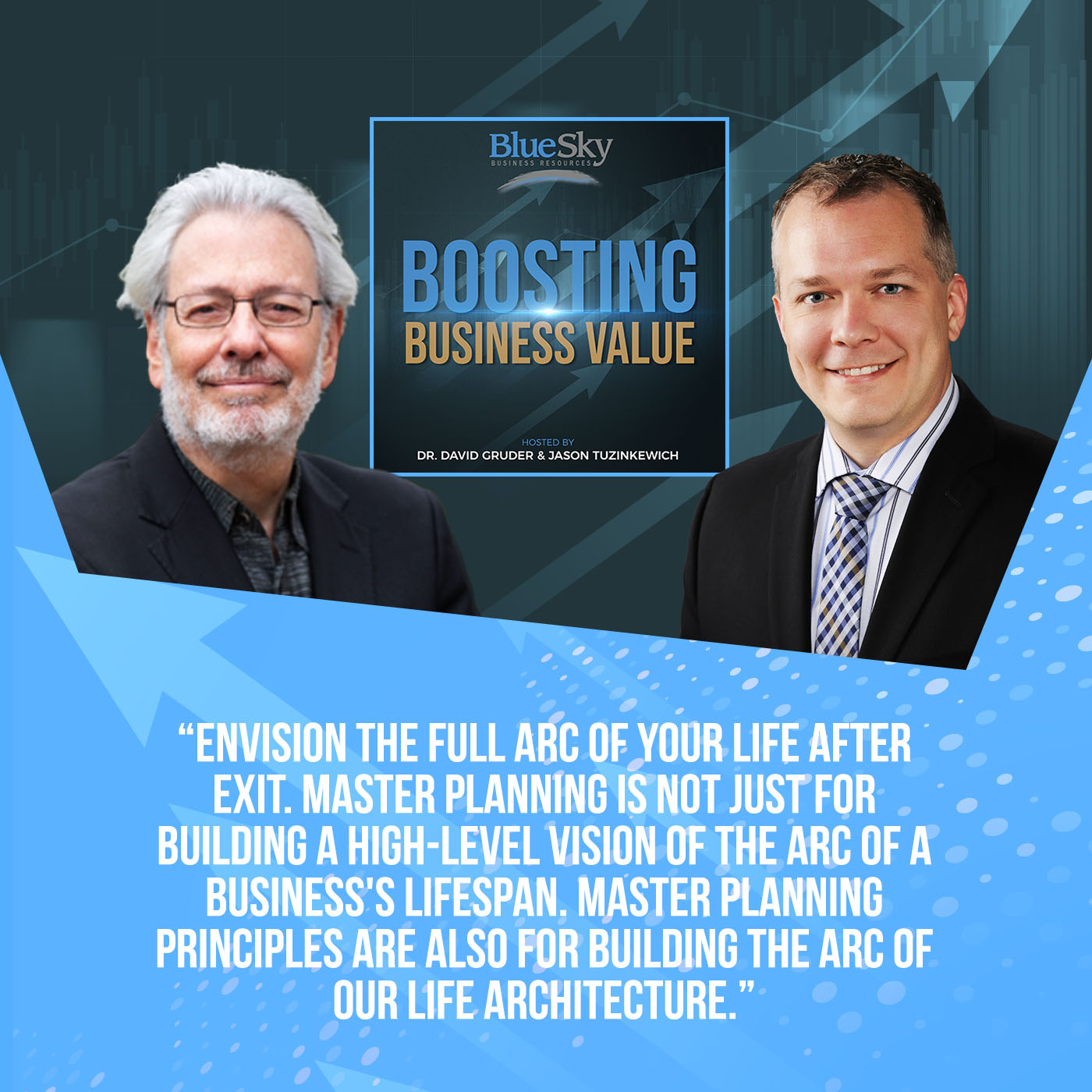Ep. 03 - Getting Over The Fear Of Selling Your Business

How do you know when your business is ready to be sold? Are you ready to sell? Do you already know what the next chapter of your life is going to be? These are all the things you should know beforehand. In this episode, Dr. David Gruder and Jason Tuzinkewich cover key challenges that business owners face in deciding when to sell their businesses. They pull back the curtain on what's beneath those challenges and provide you with useful tips for resolving those root causes. Dr. Gruder and Jason wrap up the episode with some practical steps you can take to reliably determine when your business is ready to be sold.
---
Watch the episode here
Listen to the podcast here
Getting Over The Fear Of Selling Your Business
Key Guidelines For Deciding
In this episode, we're going to talk about how you know when your business is ready to be sold.
Do you know also is relevant, but we're going to focus on the how to know for sure. We're going to start off by just simply discussing a couple of the most common challenges that we see businesses facing when it comes to knowing when it's time to sell and when the business is ready to sell. The first of those is that the business owner doesn't want to think about selling because they're in a state of fear about that.
Either having to do with accepting their mortality, if they're older, or if they're not at that point in their life where they're worried about their mortality, then fear having to do with not yet fully seeing their next life chapter after selling the business. At least not in a form that excites them to the point where they just can't wait to sell.
Along with that is a common fear that has to do with identity loss. An awful lot of people who have built a business from scratch or who have been with a business, an executive, or an owner of a business for a long period of time have inadvertently commingled their sense of self, and their identity with the business. What that leads to when contemplating selling a business is, “If I sell the business, I won't know who I am.” It's terrifying. That's one set of challenges that owners face related to fear.
Fear creates a self-defeating cycle that gets in the way of other things, too. The next thing that is a great challenge for most people is financial. As a business owner, do you know that your business will provide the nest egg that you need after exiting and into your retirement? Are you going to be able to take care of your children? Do you have grandchildren you want to put through college? What do you need financially?
Part of that, if you're so caught in fear that you don't know who you are and what you're going to do after being a business owner, then you can't even begin to identify what you need financially. You've got that self-defeating cycle. If you're not dealing with the fear piece, then you can't properly address the financial piece.
The third of the most common challenges that we see business owners have when it comes to deciding whether they're ready to sell the business is overestimating the business' value. This is common. If you're a business owner and you think your business is worth a certain amount, and you start getting feedback that your head is in the clouds, just know that that's a common phenomenon. We get so emotionally wrapped up in our business and in knowing in our hearts what the business should be worth after all our blood, sweat, tears, and years that it's not uncommon to overestimate where we think our business is worth more than it can be sold for.
Along with that is also overestimating the number of potential, viable, legitimate buyers that are available to purchase, thinking that the buyers are just going to be lining up to purchase in droves. There'll be this huge bidding war from a whole bunch of different acquirers. Overestimating is another common challenge that we see around the theme of how you know when your business is ready to be sold.
Your baby's always the best-looking one in the nursery. I have yet to come across a business owner that had an accurate sense of what their business is worth. Most of them, like Dr. Gruder said, hugely overestimate, but the ones who aren't hugely overestimating are frequently underestimating. There's a well-studied and understood psychological factor called the Kruger Dunning Effect. The Kruger Dunning Effect talks about the less you know about something, the more confident you are in your opinion, and the more you know about something, the less confident you are in your opinion.

This obviously plays in your business. You know a ton about your business, but most business owners don't know anything about the M&A transactional marketplace or business valuation. They don't know the risk factors. They don't understand discount rates, all of those things. Why should they? They're running a business. They're experts in what they do.
They're going to be more confident because of that lack of knowledge in their opinion of what their business is worth. If they're a country club business owner and they hear one of their buddies get 6 times multiple, their business should get 8 times multiple, right? “I know what that guy's doing, and that's nowhere near what I'm doing.” It's always important to get some experts in to build that rationale and that framework of what is sensible. The earlier you have that framework, the easier it is to achieve your goals from whatever starting point you have.
Don't be wigged out if you're overestimating or underestimating your business. Just know that that's common and that there is a very clear solution, which is objective, independent, and expert valuation.
Also, know that it takes time. You cannot change these things overnight. It's something you want to start thinking about and talking about, just like your personal plan for after being a business owner, taking the time to know where you're at from a value standpoint, and giving yourself enough runway before you want to leave, that you can get to where you want to be.
I want to be explicit about that. It takes time to close the gap between what you think your business is worth and what it will be able to be sold for.
We spent a little bit of time on that and I appreciate that. This color is good and fun, but it's important to shift gears and start talking about what business owners do not know about the topics that are causing them the biggest challenges. We touched on it, but let's dig deeper into that.
As we've been saying all along, the fears and the knowledge gaps that we're talking about are normal. You can stay silent about these dilemmas or about your fears or you can avoid facing your fears because of this, but that's not going to be helpful to your goal of selling your business. As most business people, if you don’t know how to resolve the fears that you have or to fill the blind spots that you have, then that's not uncommon either.
When we're running a business, that's what we're focused on. We're not focused on these things and therefore, we don't have the level of expertise with these issues that we have with running our business. If we don't know how to resolve these fears, no big deal. The differentiator between an effective business owner and an ineffective business owner is not their blind spots or their fears.
It's whether or not they recognize they need assistance in dealing with those. That's what separates the winners from losers. Some of these things are relatively easy and straightforward to deal with. Others take a little more time and effort, but all of them can be dealt with in straightforward ways so you can take your control back.
I love the concept of taking your control back. The thing about these fear elements that we're talking about is that these are the things that will wait for you. They're like the tax collector or the work that's sitting on your desk. You go away. You don't look at it for a while, you turn around, and it's right there, ready for you. The sooner that you turn around and face your fear, the quicker you can get past those fears and start taking control. When you have control, when you have a plan, then there's nothing to be afraid of.

In my last business, I launched an alternate fuel tech company in the Netherlands. I never dealt with exit planning. I never thought about leaving. I was a young kid. I had all this runway in front of me, and then I had a family crisis. I had to leave everything in Holland to come home. I lost my trousers. I still have the patents and I still have royalty rights, but that's all I walked away with. That's not the situation that you want to be in.
The sooner that you start facing those fears, talking about, “What's next for me? Who am I going to be when I'm not an entrepreneur? What am I going to do? What do I need financially? What does all of this look like?” The sooner you start facing their fears and you turn the light on them, the less scary they are.
The thing I'll piggyback on about that is a fundamental psychological law of wake-up calls. This is an immutable law. It's just the way it is. We always have a choice to delay answering a wake-up call, a nudge, the kinds of things that you were just talking about, Jason. We can always choose to wait, but the choice to ignore a wake-up call is always the choice for the wake-up call not only to come back later because wake-up calls are patient. They're more patient than we are.
When the wake-up call recycles later, it will recycle at a next higher level of intensity. Wake-up call intensity levels will increase until they are finally loud enough to be, in the worst-case scenario, bludgeoned into surrender. Our wish for you is that you will answer these nudges, these wake-up calls, and address these fears and these blind spots sooner than later so that they don't come back later to bite you where the sun doesn't shine.
Address your fears and blind spots sooner than later so they don't come back to bite you where the sun doesn't shine.
I'm historically notorious for being hard of hearing. I got into this business so that I could hopefully help other entrepreneurs that have the same hearing problems that I do with regard to the wake-up calls.
The last thing that we wanted to touch on, we've already touched on about what's causing these challenges, which is again, being so close to your business that you've lost your object objectivity. That's because most business owners don't have reason to pay close attention to how active the M&A market is or isn't at a given point in the cycle or to its current dynamics or those external factors. These factors external to the business are going to come into play when considering selling a business.
That external objectivity that you're talking about doesn't make in and of itself for successful operation. It's an enhancement to a successful operation. With that great groundwork laid out, it's time to start getting positive and hopeful. Let's start talking about how you build a roadmap for success and what you are looking for when you realize that there's this blind spot in your business and you're ready to look for a solution.
We've hinted at it a few times, but the first and most important thing is to assemble your team. I always think of Anchorman, that scene where he finally has to come back and do the news. He gets out of the bathroom all dressed up and he screams, “News team, assemble.” They're all over at the pool table right there. They’re like, “We've been here the whole time.”
Most of your advisory team is that news team. Your CPA is there. They've already been there. You know you need them. You're just not getting the best that you can from them. You likely have a financial advisor, whether or not they're the exact right advisors for you, we can deal with next, but you have elements of the team already.
You probably don't have a complete team. Very few business owners, when they're not looking at growing through acquisition, raising capital, or exiting their business, don't have an attorney that does M&A work or a psychologist that can help with cultural integration and the psychology of stepping away from your business. An M&A transaction advisor that knows the marketplace knows valuations, knows who's doing deals in your area. Those are all things that you probably don't have, but they're there, ready and available, and willing to help you at any time in your business life cycle.
The other thing is your family. Your family is going to be deeply impacted by the decisions you make within your business. They should have a seat at the table. It matters to them. They matter to you. They should be part of this decision-making team. When you have all the seats filled in this advisory team, then you can start getting everybody on the same page and share the knowledge and expertise that all your support system has to guide the business and you into an exciting exit and the next chapter of your life.
The number one thing is to assemble your team. To assemble your team requires a huge amount of clarity around exactly what types of expertise need to be on your team. That's for your exit team. If you're successful in your business, you've had clarity about the ranges of expertise that are necessary for your business to grow and thrive, but that's not the identical team that needs to be brought on board for exiting a business. Some of those team members will become part of the exit team, but there are other members that need to be added to the team when you're looking at the exit. One or more of those team members are going to help you focus on envisioning your life after exit.
With the assistance of your team members who help you handle this, including preferably, hopefully, an exit planning psychologist, look for things to do with your time, hobbies, ambitions, desires legacy that you have set to the side, most likely to one extent or another because you've been so busy working for so many years on building your business. Once you're clear about what I refer to as your ideal calendar, lifestyle, and legacy, the next chapter in your life, then structure your financial planning and exit logistics based on this with the team members that you've brought on for exit implementation to help you with those financial planning and exit logistics.
That hobbies, ambitions, and desires section, that's something that a lot of people underestimate. A quick anecdote here. Years ago, I was working with a gentleman that had a machining company who did some great work. He has the original design specs for the Duesenberg engine, the straight-12. It’s just amazing, cool stuff.
The whole time that we were working on his exit, he was talking about how he was going to spend a lot of time with his wife. They had all this travel that they wanted to do. He was just so excited about having the freedom of not running a business anymore, but travel was the big thing on his list. Months ago, he called me back up. He's like, “Jason, I've got a business I want you to look at.”
I'm like, “You’re retired. You’re supposed to be traveling.” He's like, “I'm going to ice Iceland in September. That was the last place on our list. Now I've got to do something else.” Think these things through and make sure that you can fill enough time. Golfing is the one that I hear about a lot. “I'm going to go hit the links every week.” That's real fun for about a year and then it's like, “I'm golfing again.” It becomes a chore.
They will golf themselves to death.
You've been watching too much Caddyshack.
That's a great example you just provided.
It breaks my heart when people are caught unawares and unprepared. That's terrible. A lot of times, something terrible happened to the owner and the family's trying to not only care for or grieve for the loved one, but they're also trying to figure out what to do with the business that doesn't have a plan. You've got the entrepreneur who ends up with seller's remorse because he's got so much life left and he doesn't know what to do with himself or herself.
I want to deliver a punchline on that. Don't simply envision your life after your exit. Envision the full arc of your life after exit. Master planning is not just for building a high-level vision of the arc of a business' lifespan. Master planning principles are for building the arc of our life architecture as well.

I will tell you that I've spent a good amount of time on Dr. Gruder’s couch. I still don't know what I'm going to do when I grow up. It's been a lot of fun. This has been a great conversation. Thank you again, Dr. Gruder. As always, I want to make sure that we leave you all with some takeaways. One of the things that I can say as an entrepreneur is that we all recognize that entrepreneurship and business ownership feel lonely as roles and responsibilities, but isolation isn't a requisite of those positions.
It's not only optional, but it's not wise to be alone and lead your business. Get a team. Find your support. Have all those trusted advisors that you can consult with and that can be there as support when things are tough. They can be there to celebrate when with you when things get good and help you keep your rudder straight. It's so important. There are people out there, professionals that want to be part of that team to support you in what you do extremely well.
This is the second takeaway. The sooner you cross the threshold of your fears and move through them all the way to the other side, the sooner you'll become fully capable of taking control. Therefore, the better your outcome will be able to be. Here's what's embedded in that takeaway. Being ready to exit doesn't mean you need to act on the exit now because of the gap that we talked about earlier between how much you think your company's worth versus how much it's worth at the moment and how much you need it to be worth in order to pull the trigger on selling it. Being ready simply means you'll know more clearly when to act.
You'll know what to do when you act. You'll know what you're looking for and what you need. The team will all know that, too. One of the things that I will say in exit transactions, business owners almost never go with the highest bidder. Money's important, but there are all those other things, making sure that the legacy of your company is cared for, making sure that your staff can continue on and be happy and successful. All of those soft elements are important.
It's easier to achieve those if you go out into the marketplace, knowing what buyer you're looking for. Last but certainly not least, you are not your business. Business can be a big part of what you do. It can be a massive boost to the things that give you the feeling of value and joy in life, but they do not define who you are. The sooner that every entrepreneur can start to appreciate that there's a line where the business ends and where you begin, the easier it will be to be a great steward of that business.
You are not your business. Business can be a big part of what you do. It can be a massive boost to the things that give you the feeling of value and joy in life, but they do not define who you are.
With that, we thank you for reading this episode. We look forward to reading your thoughts, questions, and requests in the comments section. We also invite you to click the subscribe button so that you can be notified immediately when we release future episodes. Until then, boost your business value well.


0 comments
Leave a comment
Please log in or register to post a comment